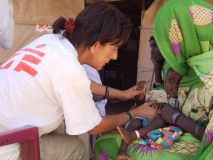Aid groups not free to speak about Darfur – poll
May 24, 2007 (LONDON) — Most aid agencies in Darfur cannot speak openly about the humanitarian situation in the violent west of Sudan for fear of jeopardising their work or being thrown out, according to a Reuters AlertNet poll released on Thursday.
 Four-fifths of those surveyed said they could not talk about who was behind attacks on civilians and aid workers in case they upset the government or suffered reprisals from militias and rebels. More than two-thirds would not discuss rape.
Four-fifths of those surveyed said they could not talk about who was behind attacks on civilians and aid workers in case they upset the government or suffered reprisals from militias and rebels. More than two-thirds would not discuss rape.
“Speaking about touchy issues might result in restrictions and an order to leave the country which we do not want to risk, considering many people depend upon our support,” one agency told aid information Web site AlertNet.
The conflict has triggered the world’s biggest relief operation with aid workers helping some 2.5 million people who have been forced to flee their homes.
But two-thirds of the 46 international agencies polled said they could not speak freely about the humanitarian situation. Almost all asked to remain anonymous to avoid repercussions.
“All humanitarians are considered as spies against the government,” one aid worker said.
“If we speak openly … we find that the government will then restrict our access to programme areas by delaying visas, travel permits etc,” another agency said.
“They will also withdraw support, such as protection against bandits and searching for stolen vehicles and kidnapped drivers.”
ATTACKS
Darfur is one of the most dangerous regions for aid workers — 34 have been killed since 2004 and scores wounded. Gunmen have stormed agency compounds, abducted relief workers, shot at aid convoys and stolen vehicles.
But many agencies said they would not publicly identify perpetrators for fear of endangering staff. They also said it was vital they were seen as neutral to maintain access to those in need. Several stressed it was often hard to know who was behind attacks.
“I’m thinking all the time about the security of our staff — if there could be any retribution. That’s our main concern,” one agency official said.
“There might be attacks or rapes or robberies against our own staff or the people in our programme (if we comment).”
The ethnic and political conflict flared in 2003 when rebels took up arms, saying the government was neglecting the region.
Khartoum is accused of using Arab militias, known as Janjaweed, to crush the revolt — a charge it denies. The United Nations says 200,000 people have been killed although Sudan says the figure is 9,000.
Rights groups accuse the Janjaweed of widespread rape as part of a terror campaign. But Khartoum says rape is not part of Sudanese culture.
“Rape is a completely taboo subject. The Sudanese government does not want to hear about it,” one aid worker said, adding that their agency had suppressed reports on the issue fearing Khartoum could limit their operations or even expel them.
Most organisations were also reluctant to talk about restrictions on their work.
“If you decide to be vocal, you might spoil the only chance you have to help those in real need,” one group said.
The majority of agencies said they could speak about conditions in camps, aid distribution and food shortages.
The poll was conducted in May. Five organisations declined to take part.
(Reuters)
